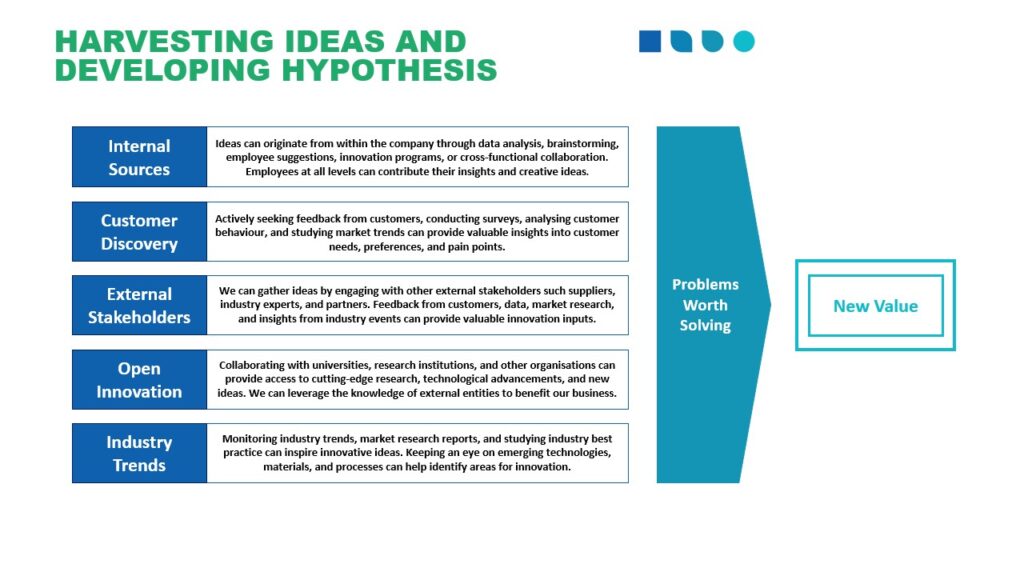
Innovation
In a world constantly craving the next big thing, innovation is often thought of as the Holy Grail of progress. We celebrate innovators, gadgets, and disruptive technologies, extolling them as the symbols of human advancement. But after many years working as a trusted advisor to innovative organisations seeking to gain an edge, I have found this to be universally true:
if innovation is what you want, then it’s probably insight that you really need.
If your innovation program isn’t yielding the results to which you aspire, and if the outputs leave you feeling underwhelmed, then consider if you are acting on impulse and not insight; hope rather than strategy.
Think of it like a tree: if you want more fruit, nurture the roots.
Most iconic creation and radical shift in our world, has its roots not just in the act of innovation, but in the quality of the insight that fuelled it.
Same for strategy – ask yourself what is the unique insight that provides your competitive advantage? If you can’t answer this, you might want to think a little deeper. Remember: winning strategies are built on genuine insights.
Understanding the Essence of Insight
Insight is often thought of that “Eureka!” moment when the stars align in our minds, and we suddenly grasp something we’ve never seen before. It’s thought to be an epiphany, a revelation, a moment of profound understanding. But it’s not just a matter of chance or luck. Insight is born from a synthesis of knowledge, experience, and creativity. It’s the product of inquisitive minds, clever analysis, the ability to challenge the status quo, identify points of leverage and push the boundaries of what’s possible.

Take the story of Sir Isaac Newton, sitting under an apple tree when an apple fell on his head. It wasn’t merely the falling apple that sparked his insight. It was his ability to connect that seemingly mundane event to the deeper understanding of gravity, which eventually revolutionized our understanding of the universe. The apple stimulated an insight, not an idea.
Or consider Archimedes, who, while stepping into a bath, discovered the principle of displacement. Insight led him to the profound understanding of how to measure the volume of irregularly shaped objects.
These historical examples are not isolated incidents but are representative of how insight has continually shaped the course of human history. Insights like these fuel the fire of innovation, pushing the boundaries of what is possible.
Insight as the Catalyst for Innovation
Innovation is often portrayed as a linear process – a systematic sequence of steps, from ideation to execution. However, the real story is far more intricate. It’s not a simple A-to-B journey but a dynamic dance of creativity, trial, error, and, most crucially, insight.
Insight operates as the catalyst for innovation. It’s the impetus that propels us from the comfort of the familiar to the realm of the unknown. When we experience that “Aha!” moment, it’s not actually like a light bulb switching on; it’s more like new possibilities opening up, and critically, others being eliminated.
However, insight doesn’t exist in a vacuum. It thrives in an environment that encourages and values creativity, diverse perspectives, and open-mindedness. It’s the collective insights of teams that often lead to game-changing innovations. When insights intersect and overlap, the results can be transformative.
Fostering Insight-Driven Innovation
Now that we recognize the profound role of insight in innovation, the next logical question is how can we foster a culture of insight-driven innovation? Here are some ideas:
- Expect insight and ask for it: If you want more insights, try asking ‘what is the insight?’ Don’t only collect and evaluate ideas, coach people to strive for insight and identify problems worth solving. This may require cultivating a coaching approach among leaders at all levels.

- Find the hidden value in data: Data is everywhere. Think carefully about the data sources that may contain hidden insights. Netflix, with its maverick mindset, saw beyond the tapes and discs – an insight Blockbuster missed despite the available data.
- Encourage exploration, expect analysis: Give employees the time and space to explore ideas and concepts outside their usual domains. But expect analysis and not just opinion and beware of the very human biases that are bound to exist. For true innovators, insight isn’t a stroke of luck but the result of balanced and disciplined thinking.
- Role model curiosity: Encourage questioning and curiosity at every level of your organisation and role model the behaviours you want to see. When people feel comfortable asking “Why?” and “What if?” without fear of judgment, they’re more likely to uncover insightful discoveries.
- Be open to serendipity: Serendipity plays a role in many significant discoveries. Sometimes, you need to be open to the unexpected, the unplanned, and the seemingly random events that can lead to profound insights.
This of course means being open to changing your mind and that might be the hardest thing of all.
Conclusion
While innovation may be the goal, we should remember that without insight our innovation goals may be thwarted.
Insight is not a fleeting moment; it’s disciplined analysis and intelligent interpretation that, when harnessed, can become the driving force behind innovation.
To unlock the transformative power of insight, we must cultivate a culture that values curiosity, embraces diversity, expects analysis and encourages exploration.
But most of all, we must be disciplined in acting only on insights and not on impulse and, to do this across the whole organisation, we must encourage our leaders to ask ‘what is the insight that makes this a problem worth solving?’
“Innovation is seeing what everybody has seen and thinking what nobody has thought.” – Dr. Albert Szent-Györgyi
If you are experiencing any of the above symptoms in your business and would like to learn how to optimise your business insight approach get in touch with us at IMS Projects.
